
| WWT Shows | CLICK TO: Join and Support Internet Horology Club 185™ | IHC185™ Forums |

|
• Check Out Our... • • TWO Book Offer! • |
Welcome Aboard IHC185™  Internet Horology Club 185
Internet Horology Club 185  IHC185™ Discussion Site Main Page
IHC185™ Discussion Site Main Page  Horological Discussions, Questions and Answers
Horological Discussions, Questions and Answers  Clocks, Including 400-Day Discussions
Clocks, Including 400-Day Discussions  Mechanical clocks & RR watch accuracy
Mechanical clocks & RR watch accuracy
 Internet Horology Club 185
Internet Horology Club 185  IHC185™ Discussion Site Main Page
IHC185™ Discussion Site Main Page  Horological Discussions, Questions and Answers
Horological Discussions, Questions and Answers  Clocks, Including 400-Day Discussions
Clocks, Including 400-Day Discussions  Mechanical clocks & RR watch accuracy
Mechanical clocks & RR watch accuracyGo  | New Topic  | Find-Or-Search  | Notify  | Tools  | Reply to Post  |  |
Are there mechanical, wind-up antique clocks that are as accurate as the RR watches (accurate within 30 seconds a week.)? | |||
|
| IHC Life Member |
Yes there are But I'm not a clock guy. Here is a link to a few of Toms Clocks. Here is a Link to one of mine that was down to 10 seconds a week till I turned the nut on the pendulum a little far and now it is at 20 seconds a week. WELCH #1 I also have a Seth Thomas #2 that keeps it to with in 10 seconds. The problem with this one is it only has one weight and the clock stops when you wind it. Then you have to reset it after it is wound. | |||
|
| IHC Life Member |
Correct me if I'm wrong you clock specialist. That the longer the pendulum. The easy it is to get it to keep excellent time. I'm sure there is a lot more factors involved Like starting with a good clock to begin with. Clocks with a dead beat escapement, properly overhauled and so on. I'll do a search for dead beat. | |||
|
greetings eugene, your seth thomas #2 should not stop while you are winding it because it has maintaining power. you should check to see if it works properly it could be the maintaining ratchet finger is not engaged. eddie | ||||
|
| IHC Life Member |
Thanks eddie the watch has never been serviced since I bought it. I work on watches. do you have a photo of what you are talking about. Do you have any comment for Donald as I do not want to steal his post. | |||
|
Thanks for the info. I guess I will have to look around for one of those mentioned and see if it is withing my price range. Evidently they're hard to find. How about shelf clocks? Are there any that are accurate to less than 30 seconds a week? I have some Seth Thomas ones but the best one only keeps with in 3 minutes a week. | ||||
|
Eugene, Hopefully Eddie is correct and you just need to engage the ratchet (0.) shown below. The #2 regulator is one of the easiest clocks to work on and should be easy for you to clean and oil as its parts are much larger than watches. Earlier this year I cleaned, oiled, and fixed my #2 which was purchased not running. First remove the hands and dial then the movement can be taken out of the case. Remove four plate screws shown (1.) in the picture. After removing the plate all the gears can be taken out as well as the winding gear and spool (2.) assembly. 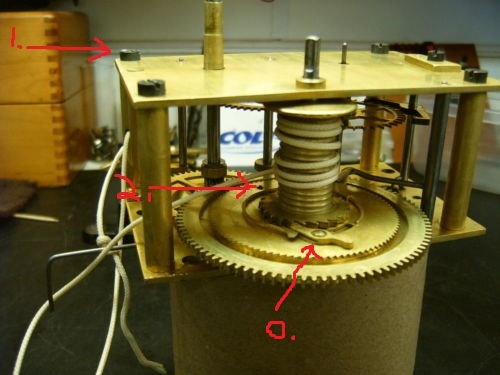 | ||||
|
After the spool assembly is out it needs to be disassembled by removing the pin (3.) next to the part shown near it in the picture. Once apart you will see the spring (5.) that provides the maintaining power. One end of the spring goes into the hole (4.) of the gear shown and the other end fits into the hole on the other piece (2.) shown in the above picture. When assembled properly you can feel the spring action by holding on to one piece and moving the other. Getting this assembly put together properly is what a local clock maker told me is the most important step that often isn’t done correct. After cleaning all parts reassemble and oil. The spool assembly needs to be oiled as it is being put together. I am unfamiliar with clock nomenclature so some of the parts might not be named properly but this should give you a general idea of what’s involved. Good Luck, RR 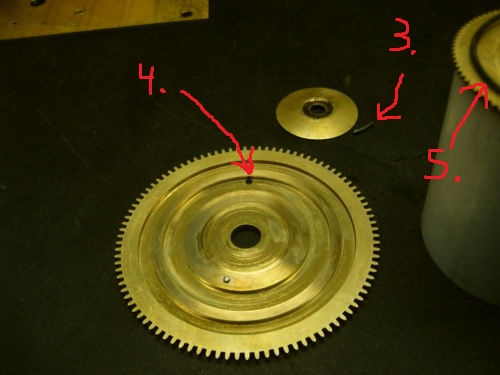 | ||||
|
Donald, I also recommend the Seth Thomas #2 Regulator wall clock. They made a bunch of them so if you keep an eye out something will eventually show up. They’re accurate, easy to work on, and look great. RR | ||||
|
| IHC Member 1335 |
I also recommend the Seth Thomas #2 Regulator,as far as I know the longest produced wall clock in history,maintaining power ,Graham dead beat escapement ,quite a magnificently accurate but simple clock,and I just love my two. | |||
|
Thanks for all the info. What's the price range for a Seth Thomas Regulator no. 2? | ||||
|
Nice photos Richard. Very clear!! Don, they seem to range around the $1000.00 mark. Maybe you can come up with one for less.. Bill Carlson | ||||
|
| IHC Member 1541 |
I love my Seth Thomas #2 and it does keep going while I wind it up. They come up quite often if you keep checking the various auction sites. I got it at an online auction, all original and working for $800 plus BP. Shipping from the eastern US to western Canada was $150 and there is always some kind of tax. I do have one question. When I first hung it up I noticed the L shaped wire that clips into the pendulum stick was bent about 1/4" to the left. The one clock guy I know suggested that I not attempt to straighten it out. I have just let it run and it loses about 5 sec. a week as it is but has an odd sound. Rather than TICK-TOCK it sounds like TICK-SHLOCK and I was wondering if the bent wire may be the reason for this. Any suggestions? And for anyone who doesn't know this there should be a date of manufacture code on the back of the case, probably quite faded. Mine is 5091A which when reversed dates it to January of 1905 | |||
|
| IHC Life Member |
Thanks every one for there suggestions on cleaning. I guess when I paid $65. for mine I got a deal. | |||
|
| IHC Member 1335 |
I'd say the deal of the decade Eugene !!!!! | |||
|
I just wanted to add my 2 cents and show you all a picture of the Ingraham clock that Harry Seyfriedt had hanging in his East Los Angeles jewelry store. From what I have researched, he and his two brothers were all jewelers in So Cal. I "rescued" it in 1961 from a flooded basement that was located about two blocks from the address on the clock (that address is a dilapidated, run down two story building now). The location was the basement under the stage at the Hollenbeck Masonic Temple on the corner of First and Chicago Streets. It was completely under water when I found it. My father refinished the oak case and I cleaned and oiled the mechanism. Fortunately the original painting on the glass wasn’t affected by the immersion. The only time when the clock hasn’t been running was when the mainspring broke around 1983 and I had to replace it. It has been very well cared for since I found it and is still keeping RR watch time on the wall of my home. Jon 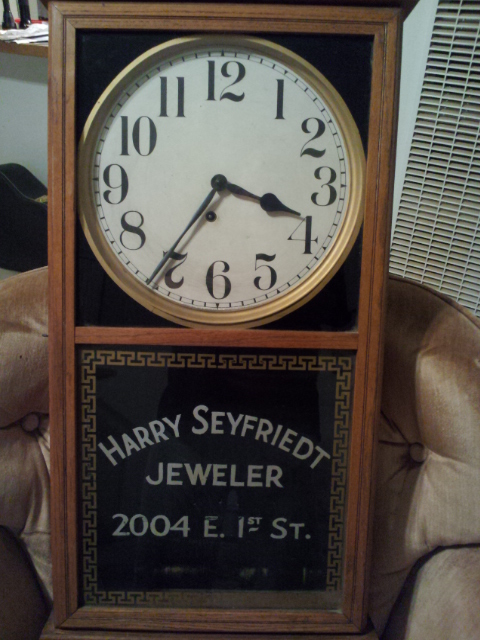 | ||||
|
Thanks again to everyone who supplied information about mechanical clocks that keep RR time. Anyone want to sell theirs? (LOL) | ||||
|
Just thought of some more questions; Are ST #2's hard to find in dark wood? (saw a lighter one on ebay for $425) Also, those that are achieving RR accuracy, how often do you have to wind it to maintain that accuracy? (I know they're 8 day movements.) How does one determine the date of manufacture? Is there a book where you can look the serial nos. up, like pw's? | ||||
|
| IHC Life Member |
The S T #2 is a weight driven clock. Because they are weight driven they are better timekeepers. because the tension on the movement is constain. The coil spring clocks have more tension when they are fully wind. and less later. I wind mine every Sunday. Sorry I can't answer any of the other questions. | |||
|
Donald, According to the chart provided below the ST #2 was offered in Oak, Walnut and Cherry earlier on then later only in Mahogany and Oak. If you notice at first the clocks were only offered in Walnut so it seems the darker models will be older. As Eugene explained these clocks are accurate due to a weight being more consistent than a spring and like him I also wind the clock every Sunday. Lorne explained the dating system above and if memory serves me right I don’t think there are serial numbers per say. There are several minor variations of the movement which should coincide with the year. I’m sure there are books to date the clocks but the chart below should get you close. 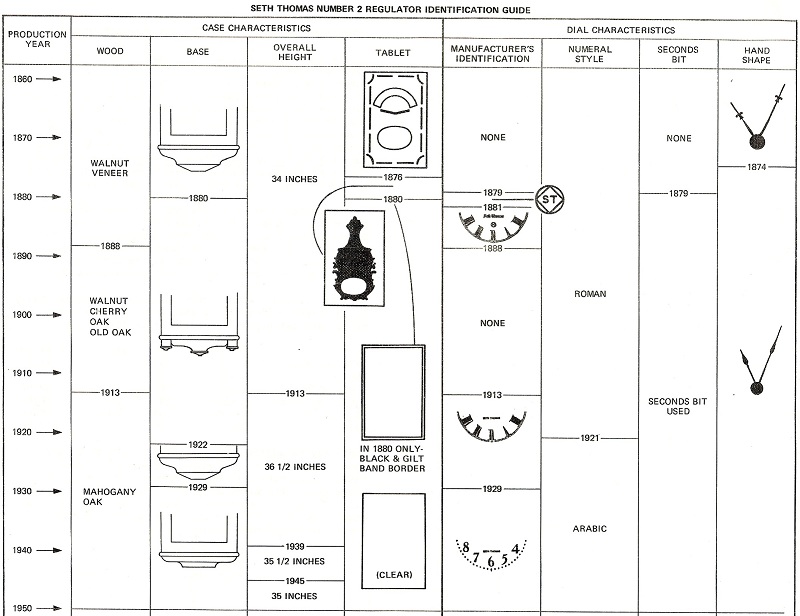 | ||||
|
Here’s the #2 that now hangs in the living room. The picture was taken while the clock was being fixed in the laundry room. According to the chart above it was made about 1922-1929. Also, these clocks have a heavy pendulum and are a joy to listen to at 80 beats per minute. 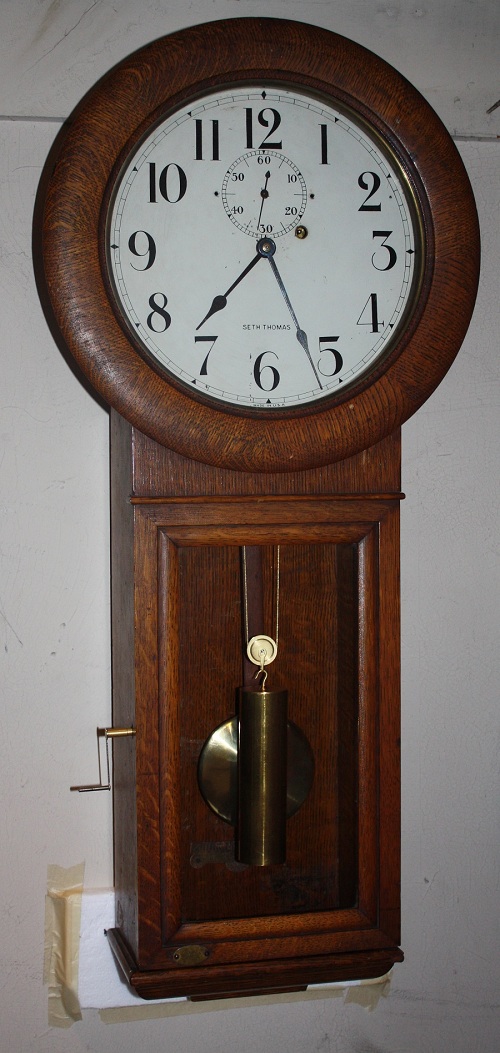 | ||||
|
Lorne, I don’t know much about clocks but if you try moving the bottom of the clock one way or the other and it starts sounding right the bent arm may be the problem. If it starts sounding correct and the clock isn’t too lopsided then leave it but otherwise the arm may have to be straightened to get the clock into beat. When I received my clock that arm is one of the first things I straightened because someone had bent it almost 90 degrees out. Jon, Nice save on the Ingraham clock it looks great. RR | ||||
|
| IHC Member 1541 |
Richard, Thanks for the info. I moved the clock both ways and there is an improvement but it is not sounding as I think it should. Next time I have it down I will straighten out that arm and if that doesn't do the job I will send it to be fixed. I assume they get bent when someone takes the pendulum out improperly but that is just a guess. These clocks originally came with a wooden holder to stabilize the pendulum so you didn't have to remove it when moving the clock. That is what those two holes by the pendulum are for. New ones are available from Timesavers. From what I have read, you are correct, there are no serial numbers on these clocks. The dating system I mentioned was supposedly discontinued around 1918. This is the date on mine 5091A indicating Jan 1905 but I had to look very hard and get the light angle just right. | |||
|
Thanks again for all the info. Richard, Iwant one just like yours. | ||||
|
| Powered by Social Strata |
| Your request is being processed... |
|
Welcome Aboard IHC185™  Internet Horology Club 185
Internet Horology Club 185  IHC185™ Discussion Site Main Page
IHC185™ Discussion Site Main Page  Horological Discussions, Questions and Answers
Horological Discussions, Questions and Answers  Clocks, Including 400-Day Discussions
Clocks, Including 400-Day Discussions  Mechanical clocks & RR watch accuracy
Mechanical clocks & RR watch accuracy
 Internet Horology Club 185
Internet Horology Club 185  IHC185™ Discussion Site Main Page
IHC185™ Discussion Site Main Page  Horological Discussions, Questions and Answers
Horological Discussions, Questions and Answers  Clocks, Including 400-Day Discussions
Clocks, Including 400-Day Discussions  Mechanical clocks & RR watch accuracy
Mechanical clocks & RR watch accuracy©2002-2025 Internet Horology Club 185™ - Lindell V. Riddle President - All Rights Reserved Worldwide

